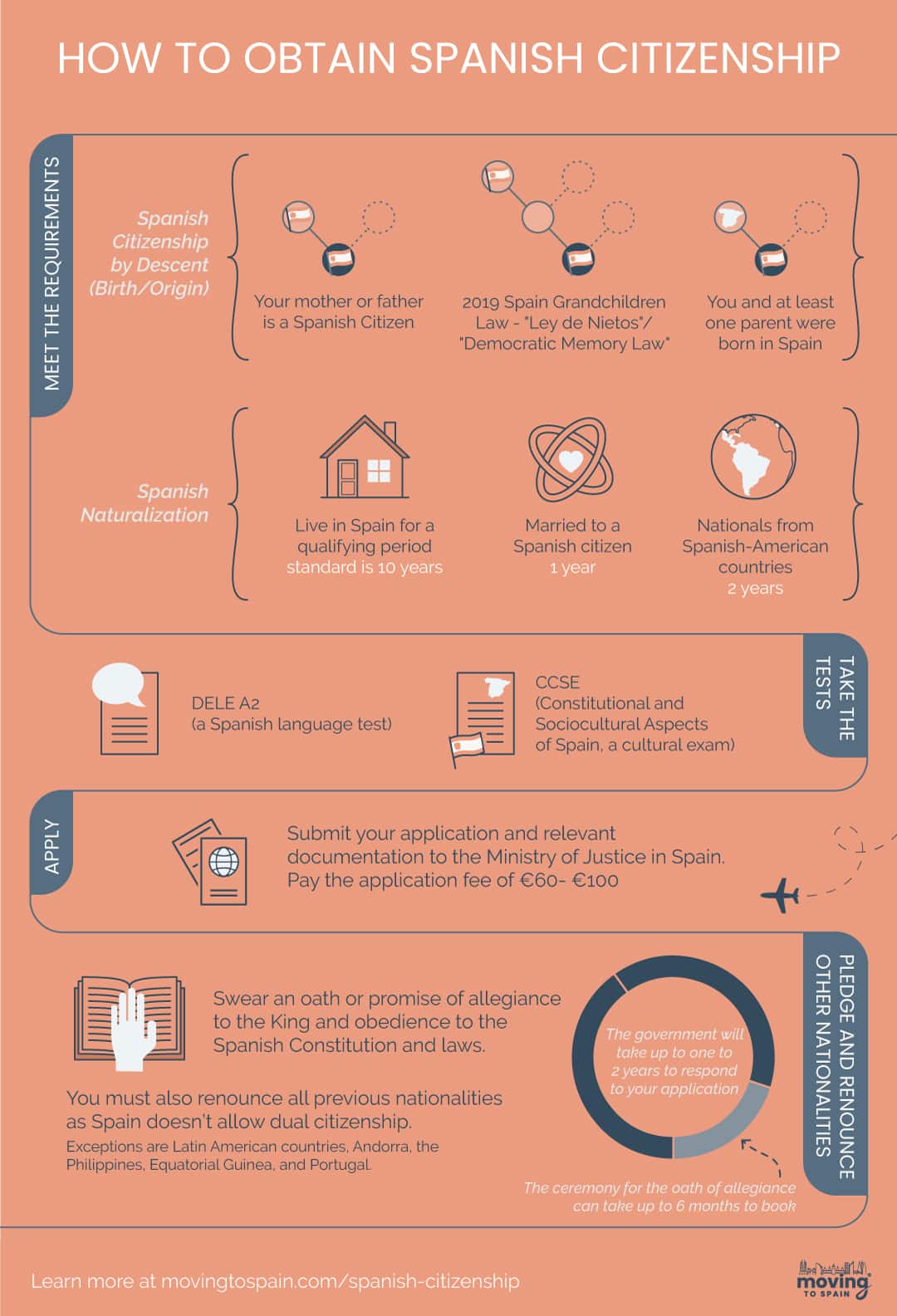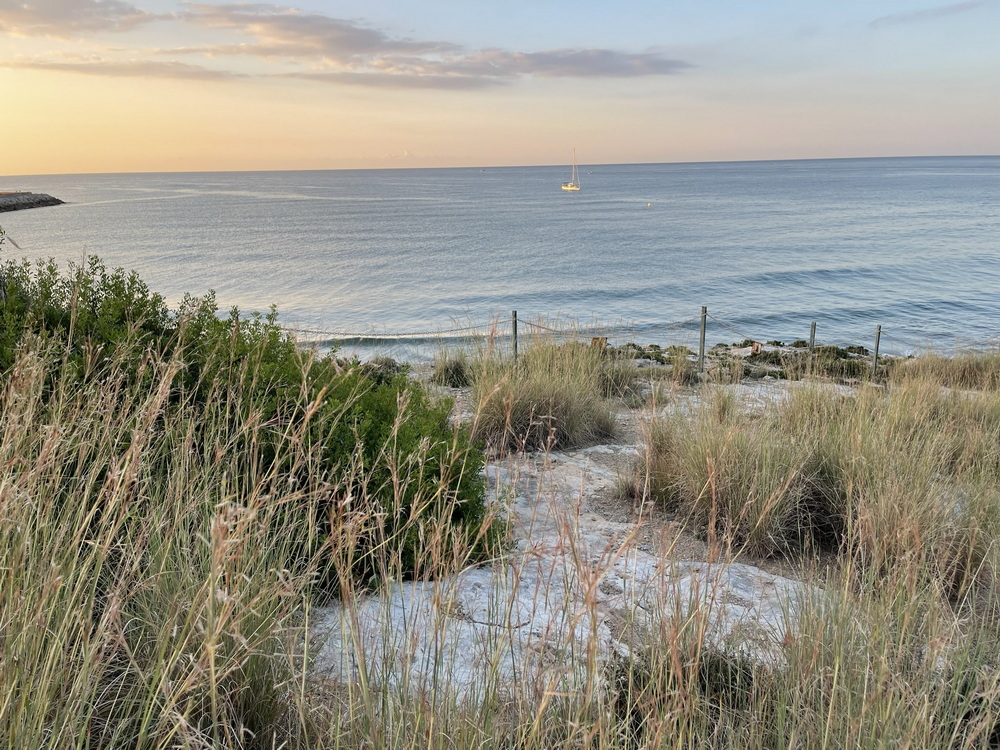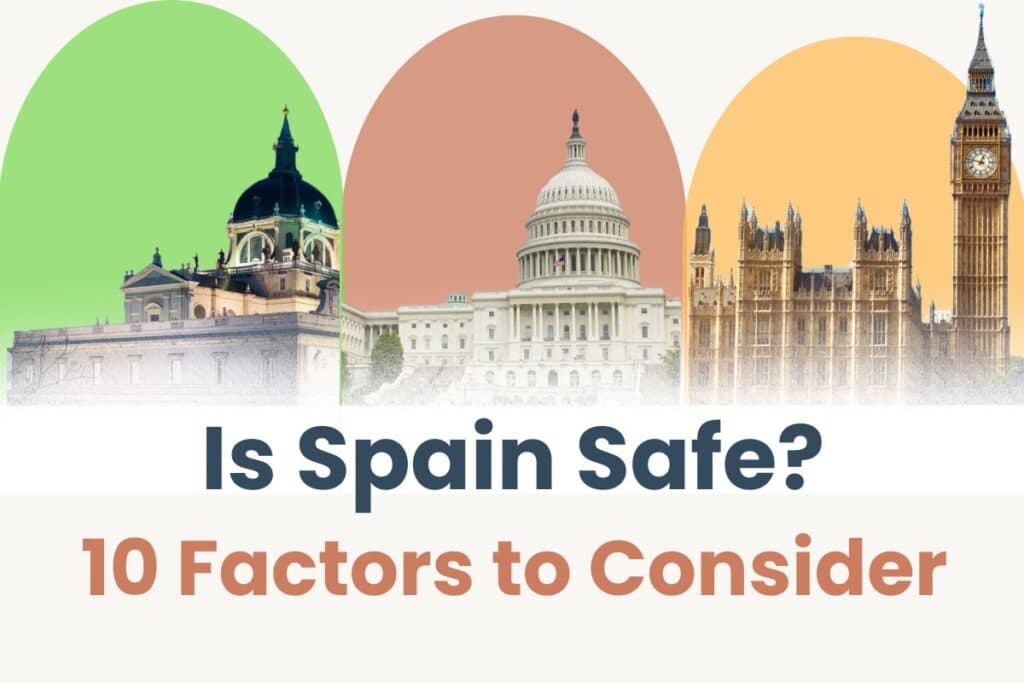There are only two ways to get Spanish citizenship. The first option is to claim citizenship by descent from qualifying Spanish parents or heritage (origin). The second is citizenship by naturalization (option). For naturalization, you’ll qualify by residency, marriage, or investment. We’ll show you how to qualify for Spanish nationality and the fastest way to get a Spanish passport.
How to Obtain Spanish Citizenship

Spanish Citizenship by Descent (Birth/Origin)
There is no qualification period for Spanish citizenship by descent. You do not have to live in Spain to qualify or apply.
1) Everyone born to a Spanish parent (mother or father) is a Spanish Citizen.
The vast majority of Spanish citizens qualify by descent. Spanish nationality is based on the ‘Jus Sanguinis’ or right of blood. If you are born to Spanish citizen parents, you are a Spaniard, regardless of where you are born. This rule applies to children under 18 adopted by Spanish parents.
2) 2019 Spain Grandchildren Law – “Ley de Nietos” / “Democratic Memory Law.”
Important: The citizenship offer closes in October 2024 – if you think you qualify, you should act now.
Three groups can currently claim descent through their grandparents or great-grandparents. You do not have to live in Spain to qualify.
- Descendants of Spanish women who lost their nationality at marriage before the 1978 Constitution.
- Descendants of Spanish Nationals by Origin via historical memory (Law 52/2007).
- Descendants of exiled parents or grandparents who were forced to leave Spain and lost or renounced Spanish nationality. The reason for leaving can include political, ideological, or religious persecution (including for sexual orientation or identity).
3) You and at least one parent were born in Spain
If you and at least one of your parents (regardless of citizenship) were born in Spain, you are Spanish by origin.
READ MORE >> Complete Guide to Spanish Citizenship by Descent Eligibility & Application
Have questions about your Citizenship application?
Our Immigration Partners, Raquel and her team, offer our clients a 30-minute consultation. They will let you know if you are eligible, explain all the steps involved, and answer all your questions.
Spanish Naturalization
Spain offers citizenship to individuals who legally reside in the country and integrate as valued members of the community. If you are a non-EU/EEA national, you’ll need a qualifying Spanish Visa or residence permit. EU /EEA citizens can live in Spain for the ten qualifying years without a visa.
Standard Naturalization Period (10 years)
For most people, you’ll need to live legally in Spain for ten years. You’ll need qualifying immigration permission, for example, Spanish Permanent Residency (PR).
Spain Citizenship by Marriage (1 Year)
Marrying a Spanish national means you only have to live in Spain for one year to qualify for naturalization.
Other Connection to Spain (1 Year)
- Born in Spain
- Under guardianship of a Spanish citizen/entity for ≥2 years
- Born abroad with a parent or grandparent originally Spanish by origin
Nationals from Spanish-American countries (2 years)
Spain has a special provision for people with historical ties to the country and from Ibero-America. See Appendix 1 for the complete list, which includes Andorra, Brazil, the Philippines, Equatorial Guinea, and Portugal. These nationals qualify after just two years.
Sephardic Jews with connections to Spain (2 years)
If you have a Sephardic Jewish heritage, you can qualify for fast-track naturalization in Spain after just two years.
Note: The citizenship offer for Sephardic Jews not living in Spain was only open from 2015 to 2019. Non-resident Spanish Sephardic nationality is no longer available.
Refugees (5 years)
If you have official refugee status, you can apply after five years living in Spain.
Spanish Citizenship by Investment (10 years)
Note: The Spanish Government ended the Investor Visa (Spanish Golden Visa) program in April 2025.
READ ALSO: Moving To Spain From The USA >> Easy 2024 Guide for Americans
Spain Dual Citizenship Rules
In most cases, Spain does not allow dual citizenship, especially for naturalized citizens.
There are two significant exceptions.
1) Spain has agreements with 24 nations. Citizens of these countries can retain their original nationalities when they become naturalized Spaniards. Please see Appendix 2 for the complete list.
2) Some countries do not allow renunciation. Qatar, Tonga, Niger, and the Vatican are some examples. Although you’ll still formally renounce your status, you’ll remain a dual citizen in practice.
How To Apply for Spanish Citizenship
Spain Citizenship Requirements
Citizenship Tests
There are two tests you’ll need to pass to qualify.
- DELE A2 (a Spanish language test)
- CCSE (Constitutional and Sociocultural Aspects of Spain, a cultural exam)
See the easiest ways to get your Spanish Language to the required level.
Documentation
Your documentation requirements will depend on your pathway and situation. However, you will need at least some of these.
- Completed application (there is an online option).
- Proof of your Spanish language capability to DELE A2 level.
- Your CCSE certification.
- Your Padrón (empadronamiento) as proof of residence in Spain.
- Copies of your passport.
- A criminal background check shows no criminal record.
- Proof of payment of the application fee (typically €60-€100).
Pledge of allegiance and renouncing other nationalities
Once your application is approved, there are two additional steps to complete.
- Swearing an oath or promise of allegiance to the King and obedience to the Spanish Constitution and laws.
- You must also renounce all previous nationalities. The renunciation is not required of nationals of Latin American countries, Andorra, the Philippines, Equatorial Guinea, Portugal, or Sephardic Jews of Spanish origin.
How to apply
The application process and requirements are complex. We strongly recommend working with an excellent Spanish Immigration Lawyer for the best chance of success. The assessment of your application can take over a year, and if it is rejected, you will need to start the process all over again.
If you do want to do it yourself, there is no restriction. You can submit your application to the Ministry of Justice in Spain either in person or online.
How long does it take?
The government will respond to your application within one to two years. After that, you’ll need to book the ceremony for the oath of allegiance, which can take up to six months.
At this point, you’ll be registered as a Spanish Citizen in the Spanish Civil Registry. You also automatically become a citizen of the European Union (EU) with all the rights and responsibilities that come with it.
So, it could be a three-year wait for your Spanish passport.
READ ALSO: Relocating to Spain Budget – What Will Your Move Cost?
How to get a Spanish Passport
You’ll need your new citizenship certificate to apply for your Spanish passport. You’ll need to schedule an appointment with the Spanish Ministry of Foreign Affairs, European Union, and Cooperation (Ministerio de Asuntos Exteriores, Unión Europea y de Cooperación). They oversee Spanish passport applications.
You must visit your local Spanish embassy or consulate to apply for your passport outside Spain.
There is a €30 fee to issue your passport.
Spanish Nationality Law?
Spanish nationality law comes from several sources. The Spanish Civil Code and the Constitution both outline some areas.
The law is regularly updated, as seen in 2019 with the introduction of the Grandchildren Law.
FAQ – Spanish Citizenship
How can I obtain Spanish citizenship?
To get Spanish Citizenship, you must live in Spain and qualify through naturalization. The standard time is ten years, but there are fast-track options, including through marriage (one year) and for some nationals (two years).
Is it easy to get citizenship in Spain?
No, getting citizenship in Spain is not considered easy. There is a lengthy naturalization period (10 years), Spain does not permit dual citizenship, and applicants must pass language and civic tests.
What is a citizen of Spain called?
A citizen of Spain is called a Spaniard, or in Spanish, españoles. The singular forms are el español (male) and la española (female).
Who qualifies for Spanish citizenship?
Anyone born to a Spanish parent is Spanish. You can also qualify by living in Spain and becoming a naturalized citizen.
Does Spain give citizenship by investment?
No, Spain does not have a citizenship-by-investment program (CBI). The Spanish Government ended the Investor Visa (Spanish Golden Visa) program in April 2025.
Can I get citizenship in Spain if I buy a house?
No, the Spanish Government closed the Golden Visa / Investment Visa program in 2025, so there is no pathway to Spanish citizenship through investment in property.
Can I qualify for a Spanish passport?
Yes, all citizens of Spain are eligible for a Spanish passport.
Can US citizens get Spanish citizenship?
Yes, but Spain does not allow dual citizenship. This restriction means that US citizens must renounce their American citizenship.
How do I get Spanish citizenship by descent?
If your parents are Spanish, you are Spanish by descent. The Grandchild Law, passed in 2019, also has provisions for some people to inherit from their grandparents.
Can I claim Spanish citizenship through DNA?
No, the Spanish government does not accept DNA as a basis for citizenship applications.
Does Spain allow dual citizenship?
Spain only allows dual citizenship in some circumstances. Most UK and US citizens who become Spanish by naturalization will not be allowed to have dual citizenship.
Can I have American and Spanish citizenship?
In most cases, no. Spain does not allow dual citizenship for US citizens.
Can I have British and Spanish citizenship?
In most cases, no. Spain does not allow dual citizenship for British (UK) citizens.
How can I get Spanish citizenship in 2 years?
Spain has a two-year fast-track naturalization option for citizens of some Ibero-American countries and Sephardic Jews.
How long does it take to get a Spanish passport after marriage?
You can apply for Spanish citizenship by naturalization after one year of residence if you are married to a Spanish citizen. The application can take up to one year to process, after which you can apply for a Spanish passport. See Pareja de Hecho >> A Complete Guide to Civil Partnerships in Spain
Appendix 1
Countries that can qualify for naturalization in two years.
- Andorra
- Argentina
- Bolivia
- Brazil
- Chile
- Colombia
- Costa Rica
- Cuba
- Dominican Republic
- Ecuador
- El Salvador
- Equatorial Guinea
- Guatemala
- Honduras
- Mexico
- Nicaragua
- Panama
- Paraguay
- Peru
- Portugal
- Puerto Rico
- The Philippines
- Uruguay
- Venezuela
Appendix 2
These countries are allowed Dual citizenship with Spain.
- Andorra
- Argentina
- Bolivia
- Brazil
- Chile
- Colombia
- Costa Rica
- Cuba
- Dominican Republic
- Ecuador
- El Salvador
- Equatorial Guinea
- Guatemala
- Honduras
- Mexico
- Nicaragua
- Panama
- Paraguay
- Peru
- Philippines
- Portugal
- Puerto Rico
- Uruguay
- Venezuela









In your article, you state that Spain does not allow dual citizenship with the United States. However, I see on your list of places for which Spain allows dual citizenship that Puerto Rico is included. Puerto Ricans are United States citizens. So how are they allowed dual citizenship?
Hi Robert. Spain treats Puerto Rican American citizens slightly differently, and they’ll ask to see a certificate of Puerto Rican citizenship (Certificado de Ciudadanía de Puerto Rico) issued by the Puerto Rican government as part of your application. All the best, Alastair
If you have a felony from more than 15 year’s ago can you get a visa
Hi Donna – I’ve checked with our immigration lawyer partner, and this was her response: “It is at the immigration officer’s discretion to grant the visa or not. Usually if it is +10 years old there is no problem”. You can book a chat with Raquel and her team to manage your application in the way that will give you the best opportunity for success. All the best, Alastair
My great grandparents were born in Spain in 1809 and were Spanish citizens on my grandfathers side. Can I apply for citizenship?
HI Laurie – it all depends on the lineage of the citizenship. You can explore the article or meet with our immigration lawyer partner, who can assess your eligibility. All the best, Alastair https://movingtospain.com/services/spain-immigration-lawyer/
What about Guam? Spain ruled Guam almost 500 years.
Hi Burt – Unfortunately, Guam is not included in the shortened qualifying time nationality list despite its ties to Spain. All the best, Alastair
Hi! What if I an trace my ancestry back at least 11 generations and that the King sent my family to what is now California?
Hi Tawni – unfortunately, 11 generations is well beyond the limit for Spanish citizenship by ancestry. It sounds like an interesting family history! All the best, Alastair
Hi i naturalised in Brazil can I clam Spanish citizenship as Latin American in 2 years though I was born somewhere else
Hi Abdul. Yes, the shortened naturalization period is for all citizens of the applicable countries (including Brazil) no matter the pathway to Brazilian citizenship. All the best, Alastair
Can a minor who qualifies take advantage of the two year rule if the parents with the visa don’t qualify for the two years?
My child is native and born a citizen of one of the Latinoamerica countries. We are not, but it is interesting to consider for a job prospect if she could get Spanish citizenship. It might tip the balance.
Hi James. Yes, if your child has citizenship of their place of birth and it is a qualifying country, they’ll qualify for Spanish citizenship in two years. All the best, Alastair
From what I understand us citizens can get citizenship and just not formally renounce it. They sign something saying they will but don’t go through with it and no one really checks this…
Hi. If someone was born in the Philippines but immigrated to the United States and is now a US Citizen (renounced Philippine citizenship), can he still get Spanish citizenship in two years if he applied for Philippine citizenship again?
Hi Jean. Once you have your Philippine citizenship again you’ll qualify for the two year Spansih citizneship. All the best, Alastair
Hi, I am Puerto Rican born and raised. We moved to United States and I married a US born and had three children. My children were all born in the United States. I know I qualify for naturalization in two years, will my spouse and kids also qualify through me?
Hi – no, each application is considered independently, and when you arrive in Spain, you will not be a Spanish citizen. However, once you qualify and have citizenship, your family will be eligible for accelerated citizenship in Spain. Our immigration lawyer partner will be able to advise on the fastest path for your entire family. Regards, Alastair
My daughter was born in Spain, on base so has her US and Spanish Birth Certificate how does this work for her ?
Hi Jen. Just being born in Spain doesn’t entitle your daughter to Spanish citizenship. You can chat with our immigration lawyers in Spain to find the best pathway to a Spanish passport for your daughter. All the best, Alastair
I have citizenship in the United States and Mexico (my parents were born in Mexico). It looks like that would qualify me to fast-track for Spanish citizenship because of my Mexican citizenship. Is they right? If so, would I need to renounce my United States citizenship?
Hi Paul. Officially, Spain would require you to state that you intend to renounce your US citizenship, but as stated, this is almost exceptionally difficult for US citizens, so this is observed more in the process than the outcome. As you’ll be applying as a Mexican citizen, there is even less cause for concern as you have dual citizenship rights. All the best, Alastair
I lived in Spain for 7 years (’96 to ’99 and ’01 ’05) I have a tarjeta de residencia and my wife is Spanish. We currently live in the UK but own property in Spain. Would we need to be living back in Spain for me to apply for Spanish nationality or could I start the process prior to moving back?
Hi Mat – unfortunatly you cannot apply from the UK.You must reside legally and continuously in Spain for at least one year before submitting your application. The Spanish Civil Code (Article 22) and Ministry of Justice guidelines specify that the one-year period must be 1) Immediately prior to the application 2) Continuous and legal (holding a valid residence permit) 3) In Spain (not abroad) All the best, Alastair
Hello! I am a U.S. Citizen who was born in Spain, at the Zaragoza Air Base 3974th USAF Hospital, and happily I have my original Certificado de Nacimiento. I also have Great-Grandparents of Spanish heritage but in that line my Grandparents are (were) Puerto Rican. I always thought I might have a dual-citizenship option available having been born there, but perhaps not? How does it work with my Birth Certificate? Much Appreciated! A~
Hi Abigale. Being born in Spain does not automatically grant you citizenship, but if you live in Spain for just one year, you can apply for citizenship by naturalization. There may be a pathway to citizenship through your grandparents, but that will be more complicated depending on the circumstances. Our immigration lawyer partner can help you understand your eligibility. All the best, Alastair https://movingtospain.com/spanish-citizenship-by-descent/